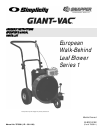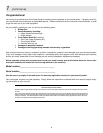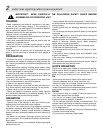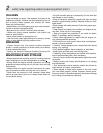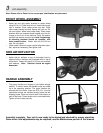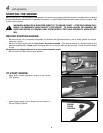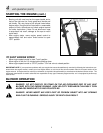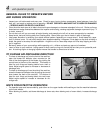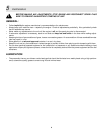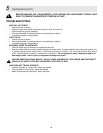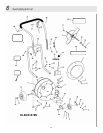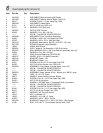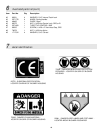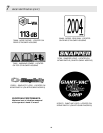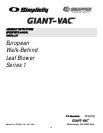
TRAINING
• Read, understand, and follow all instructions in the manu-
al and on the unit before starting. If the operator(s) or
mechanic(s) can not read English it is the owner’s responsi-
bility to explain this material to them.
• Become familiar with the safe operation of the equipment,
operator controls, and safety signs.
• All operators and mechanics should be trained. The owner
is responsible for training the users.
• Only allow responsible adults, who are familiar with the
instructions, to operate the unit.
• Never let children or untrained people operate or service
the equipment. Local regulations may restrict the age of the
operator.
• The owner/user can prevent and is responsible for acci-
dents or injuries occurring to themselves, other people or
property.
PREPARATION
• Evaluate the terrain to determine what accessories and
attachments are needed to properly and safely perform the
job. Use only accessories and attachments approved by the
manufacturer.
• Wear appropriate clothing including safety shoes, safety
glasses and ear protection. Long hair, loose clothing or jew-
elry may get tangled in moving parts.
• Inspect the area where the equipment is to be used and
remove all objects such as rocks, toys and wire, which can
be thrown by the machine.
• Use extra care when handling gasoline and other fuels.
They are flammable and vapors are explosive.
a) Use only an approved container.
b) Never remove fuel cap or add fuel with the engine run-
ning. Allow engine to cool before refueling. Do not smoke.
c) Never refuel or drain the machine indoors.
• Check that operator’s presence controls, safety switches
and shields are attached and functioning properly. Do not
operate unless they are functioning properly.
OPERATION
• Never run an engine in an enclosed area.
• Operate only in the daylight or with good artificial light,
keeping away from holes and hidden hazards.
• Be sure of your footing while using pedestrian controlled
equipment, especially when backing up. Walk, don’t run.
• Do not operate in reverse unless absolutely necessary.
Always look down and behind before and while traveling in
reverse.
• Be aware of the blower discharge direction and do not
point it at anyone. Do not operate the blower without deflec-
tors in place.
• Never leave a running unit unattended. Always stop engine
before leaving unit.
• Never operate with guards not securely in place. Be sure
all safety features are attached, adjusted properly and func-
tioning properly.
• Never operate with the discharge deflectors removed or
altered.
• Do not change the engine governor setting or over speed
the engine.
• Stop on level ground, shut off engine before leaving the
operator’s position for any reason.
• Stop equipment and inspect impeller blades after striking
objects or abnormal vibration occurs. Make necessary
repairs before resuming operations.
• Keep hands and feet away intake and discharge areas.
• Keep pets and bystanders away.
• Do not operate the unit while under the influence of alco-
hol or drugs.
• Use caution when crossing roads and sidewalks. Stop
engine if not blowing.
• Use care when loading or unloading the machine into a
trailer or truck.
• Use care when approaching blind corners, shrubs, trees or
other objects that may obscure vision.
SLOPE OPERATION
Slopes are a major factor related to loss-of-control and tip-
over accidents, which can result in severe injury or death. All
slopes require extra caution. If you cannot back up the
slope, or if you feel uneasy on it, do not drive on it.
Do
• Blow across the face of slopes; never up and down.
• Remove obstacles such as rocks, tree limbs, etc.
• Watch for holes, ruts, or bumps. Uneven terrain could over-
turn the unit. Tall grass can hide obstacles.
• Keep all movement on the slopes slow and gradual. Do not
make sudden changes in speed or direction.
Do Not
• Do not start or stop on a slope. If tires lose traction, pro-
ceed slowly straight down the slope.
• Do not turn on slopes unless necessary, and then, turn
slowly and gradually downhill, if possible.
• Do not use near drop-offs, ditches, or embankments. The
operator could lose footing or balance or blower could sud-
denly turn over if a wheel is over the edge of a cliff or ditch,
or if an edge caves in.
• Do not operate on slopes with wet grass. Reduced footing
or traction could cause sliding.
• Do not use on excessively steep slopes.
2 safety rules regarding outdoor power equipment
IMPORTANT! READ CAREFULLY THE FOLLOWING SAFETY RULES BEFORE
ASSEMBLING OR OPERATING UNIT.
3
!



